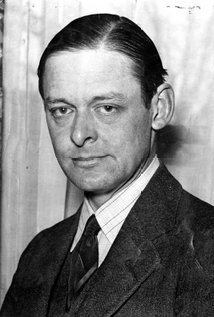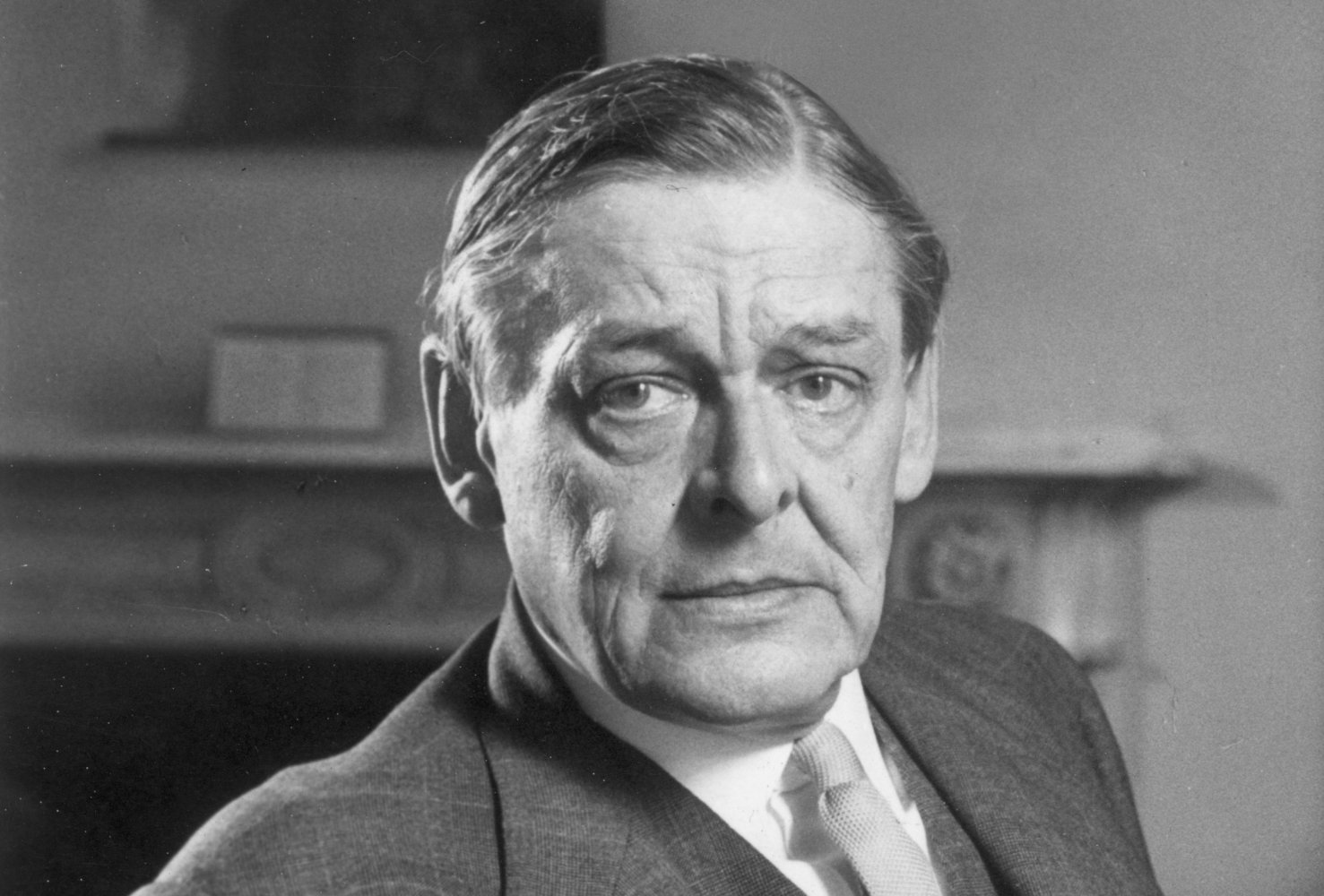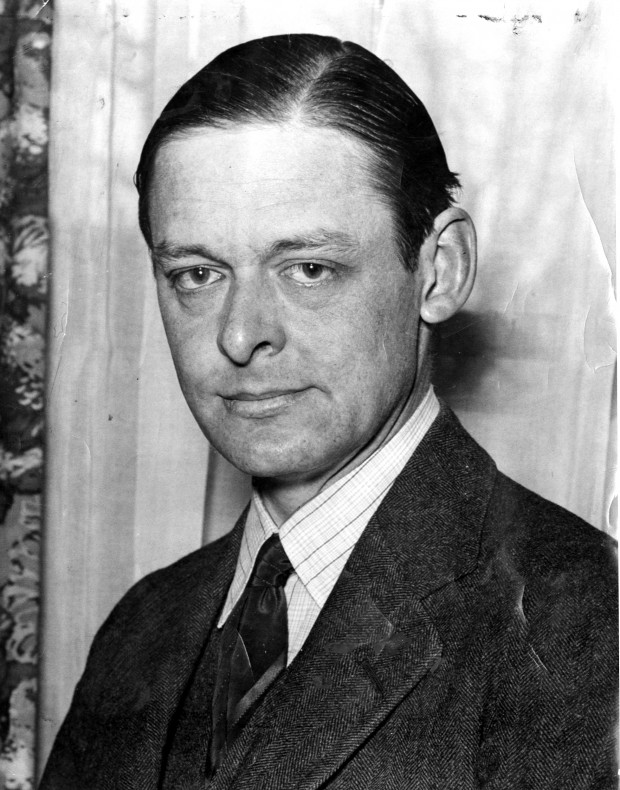T.S. Eliot ranks with William Butler Yeats as the greatest English language poet of the 20th Century and was certainly the most influential. He was born Thomas Stearns Eliot into the bosom of a respectable middle class family on September 26, 1888 in St. Louis, Missouri. The family had roots in New England, and Eliot spent summers in Gloucester, Ma...
Show more »
T.S. Eliot ranks with William Butler Yeats as the greatest English language poet of the 20th Century and was certainly the most influential. He was born Thomas Stearns Eliot into the bosom of a respectable middle class family on September 26, 1888 in St. Louis, Missouri. The family had roots in New England, and Eliot spent summers in Gloucester, Massachusetts. There was little doubt that he would matriculate at Harvard -- his cousin, Charles William Eliot was the 24th president of Harvard and turned it into a great research university during his 40-year-tenure -- and after graduating from the Milton Academy in 1906, it was off to Cambridge (on the left sight of The Pond) he went. (His cousin Charles spent his last three years as president during Thomas' first three years at the venerable institution.)Though deeply committed to literature, Eliot studied philosophy with George Santayana, William James, and Bertrand Russell (who was a visiting professor) at Harvard. Eliot completed his undergraduate degree in three instead of the usual four years and stayed on at Harvard as a teaching assistant for another year. He then studied philosophy at the Sorbonne in Paris for a year before returning to Harvard in 1911 to get his PhD.He decided to spend 1914-15 at the University of Marburg in Germany, but his plans were dashed by the declaration of the First World War. He won a scholarship to attend Merton College at Oxford and that changed his life as it put him in the vicinity of London. In London, he met Ezra Pound, Il miglior fabbro (Italian for "the better craftsman," the dedication Eliot gave Pound on the title page of "The Waste Land", which Pound edited), who championed him and provided him with vital contacts. Though Eliot completed his doctoral dissertation, he never returned to Harvard to defend it, so was never awarded his PhD.Eliot had come to loathe academia and supported himself by working in a bank as he forged his literary reputation. (Later, he became an editor at the London publisher Faber and Faber.) Enamored of England, he spent the rest of his life there, becoming a British subject in 1927. Deeply conservative, the rigid class hierarchies of England appealed to him. He eschewed the Unitarianism of his family and became an ardent Anglo-Catholic within the bosom of the Church of England. Time Magazine titled its review of his "Collected Poems" in 1936 "Royalist, Classicist, Anglo-Catholic".Eliot's first marriage to Vivienne Haigh-Wood, whom he wed in 1915 (partly to gain residency in England), was a disaster. Vivienne's biographer, Carole Seymour-Jones, attributed the strain in the marriage partly to what she contends was Eliot's closet homosexuality, though Vivienne's mental instability and poor health were major factors in the deterioration of their relationship. Eliot eventually had to institutionalize her. Eliot also suffered from mental problems and suffered a breakdown in 1921 and was treated at a sanitarium in Switzerland.The brilliant though emotionally troubled artist, whom the New York Times in its obituary called "the poet of gray melancholy,", created some of the greatest masterpieces of English literature, beginning with "The Love Song of J. Alfred Prufrock" (written in America and published in 1915) and including "Gerontion "(1920), "The Waste Land" (1922) and "The Hollow Men" (1925). The "Waste Land" was a watershed of literary modernism and revolutionized Anglo-American letters.In addition to his great poetry, Eliot was an accomplished playwright, best known for "Murder in the Cathedral (1951)" (1935), "The Family Reunion" (1935), and "The Cocktail Party" (1949). He won a Tony Award for Best Play when "The Cocktail Party" was produced on Broadway in 1950. Thirty-three years later, Eliot won two more Tony Awards, posthumously, for "Cats", cited for Best Book of a Musical and Best Original Score as the lyricist. Based on his book of whimsical poems, "Old Possum's Book of Practical Cats", the musical "Cats" was the longest-running show in Broadway history, racking up 7,485 performances when it closed its 18-year-run in the year 2000. (Its record eventually was overtaken by Andrew Lloyd Webber's musical version of The Phantom of the Opera (1925).)Eliot also busied himself as belletrist and essayist. While his belles lettres on literary topics are valuable, his essays on the human condition are less so due to his illiberal point of view. Fittingly, upon being awarded the Nobel Prize in Literature in 1948, the Swedish Academy lauded Eliot "for his outstanding, pioneer contribution to present-day poetry".Viv died in 1947. Ten years later, the 68 year-old Eliot married Esmé Valerie Fletcher, who was 36 years his junior. Esmé had been his secretary at Faber and Faber since 1949 and would be his widow when he died on January 4, 1965 at the age of 76.
Show less «





